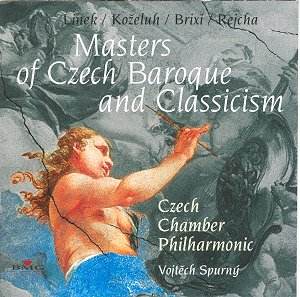Jiří
Ignác Linek is hardly a household name.
The first line of the booklet
note on him perhaps points us in the
direction of why: he is ‘a representative
of the musical culture of the Czech
village schoolmasters’. Hardly an incentive
to scurry off and fling the disc into
the machine. Apparently Linek wrote
well over two hundred works, including
a number of Christmas pastorals. His
Sinfonia pastoralis (one of two
of this type: the other is in D and
is available on Supraphon 111007-2)
was probably intended for performance
at his local church in Bakov nad Jizerou
during the Christmas holidays. It is
a bright piece that recalls J. C. Bach’s
Sinfonias. It is eminently civilised
(although, amusingly, a repeated harpsichord
note around 1’10 is rather like having
a nail hammered into one’s forehead!).
The spiky, gallant Adagio leads to a
brief (1’52) Presto that begins happily
enough before ‘Sturm und Drang’ rears
its head. Interesting.
Koželuh
(or Kozeluch as his name is sometimes
found) is perhaps better known, although
not much. Interesting to note that more
Koželuh has appeared recently on the
ever-enterprising CPO label – the oratorio
Moisè in Egitto
(1878: 999 948-2). Koželuh’s career
was more international than Linek’s,
and substantially more successful. He
went to Vienna in the late 1770s and
even refused an offer to become Mozart’s
successor to the Archbishop of Salzburg
in 1781. Immediately it is obvious we
are in a different league from Linek.
The opening is busy, impassioned, with
inner-voice tremolandi generating a
fair momentum and energy. Articulation
in this performance is superb, as is
the Czech Chamber Philharmonic’s responsiveness
to Koželuh’s
dark harmonic colourings. This is a
varied landscape, and leads to a satisfying
experience. Delicious oboes add a special
touch of colour to the hushed Adagio;
the Presto finale is marvellously sustained
here (it is easy to imagine lesser ensembles
allowing interest to flag).
The next stop on this
whistle-top tour of the byways of Czech
pre-Classicism is with F. X. Brixi.
Brixi, son of a Prague organist, wrote
over 500 works (including over 100 masses).
His music was held in some esteem by
Mozart, although on present evidence
it is difficult to see exactly why.
Not that this is bad music – far from
it, it is elegant, brisk and breezy
and most certainly does not overstay
its welcome – but it is surely of no
great import. From 1759, Brixi held
the post of conductor of St Vitus’ Cathedral,
an appointment of very high standing.
The final work in this
disc is by far the best. Antonín
Rejcha (Reicha)’s Symphony in E flat,
Op. 41 simply must be heard. Pupil of
Haydn, teacher of Liszt, Berlioz and
Gounod, Reicha’s music was significantly
more recognised in his day than now.
Until recently he has perhaps been better
known as a theorist, or among wind players
for his works for wind ensemble (try
review
).
The present symphony
dates from his first stay in Paris (1799-1802).
It is beautifully crafted – note how
the Allegro steals in after the Largo
introduction. The imaginative, richly
varied Andante un poco adagio leads
to a gentle Minuet and Trio and a finale
(‘Un poco vivo’) that shifts unpredictably
in its moods.
A fascinating disc
of little-known music, expertly performed
by a top-class chamber orchestra. The
disc seems to be available at mid-price,
a further incentive to purchase. From
the orchestra’s biography, the Czech
Chamber Philharmonic tours mainly in
Germany, Switzerland, Austria and Benelux.
Could they, I wonder, be persuaded to
grace these shores?
Colin Clarke


